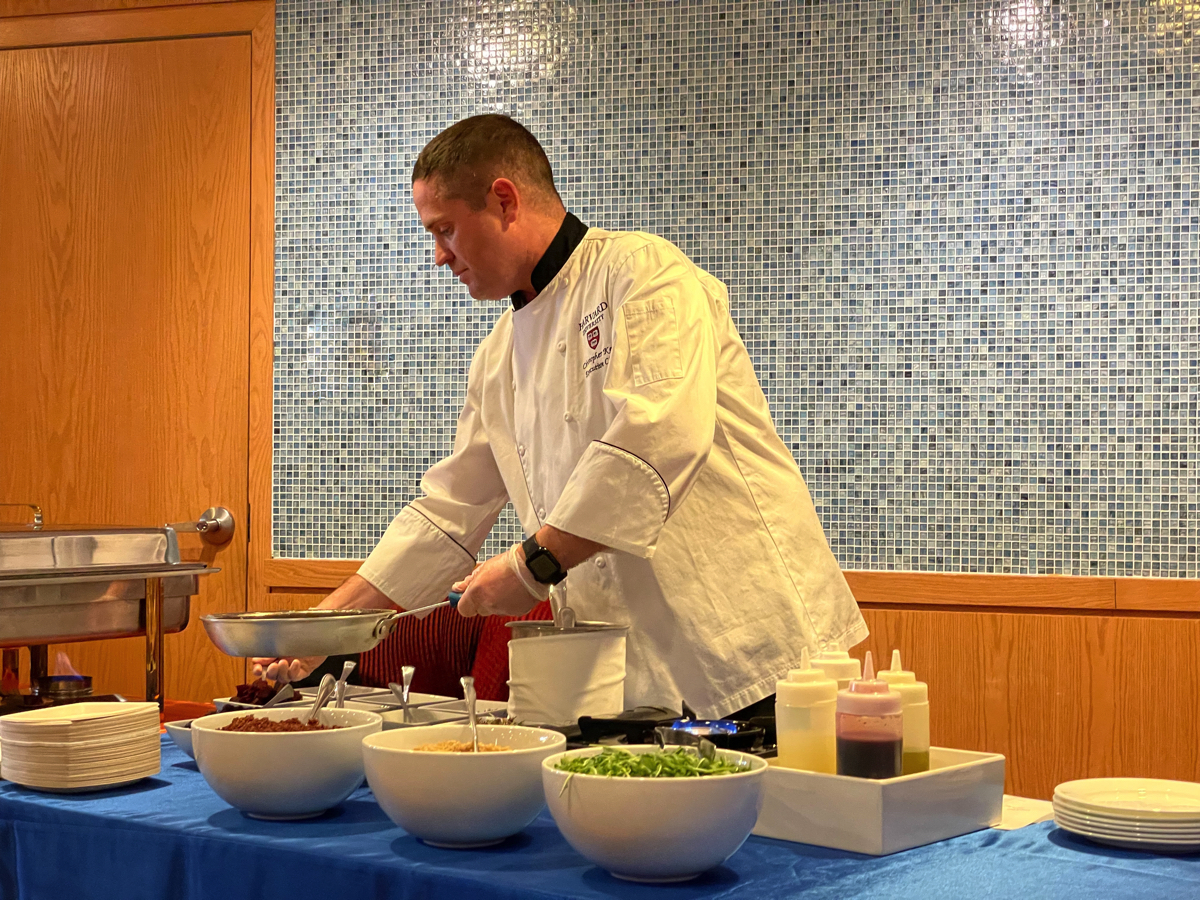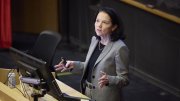Can a healthy diet reduce cancer risk? In short, yes. Nearly 25 percent of the 18 million cases of cancer diagnosed annually worldwide could be prevented with better nutrition. But what dietary habits support health? At the Harvard T. H. Chan School of Public Health (HSPH), a panel of experts discussed the fundamentals of healthy eating and addressed questions about alcohol, organic foods, vitamin supplements, weight loss drugs like Ozempic, and the role of personalized testing. The February 5 panel discussion, part of a weeklong series of HSPH events marking World Cancer Day, was followed by a live cooking demonstration with healthy recipes (see below).

A simple way to define a healthy diet, said professor of nutrition and epidemiology Edward Giovannucci, is to think in terms of proteins, fats, and carbohydrates, emphasizing healthy choices in each category. For proteins, that could be plant-based sources or lean meats. “For fats, focus on plant sources, [including] nuts, avocados, vegetable oils, olive oil,” he said, “and less on animal sources. And for carbohydrates, focus on whole grains and vegetables and whole foods, and less on processed foods.” Much of the epidemiological evidence for these recommendations comes from studies of diabetes and cardiovascular disease, said Giovannucci, but cancer risk is mediated by some of the same mechanisms.
A “plant-forward” diet—“lots of plants, not only plants”—is very helpful for long-term health, said dietitian Eliza Leone, the wellness manager for Restaurant Associates, the food service management providers at Harvard Medical School (HMS). Leone, who teaches an HMS course in culinary medicine and nutrition, pointed to Harvard’s healthy eating plate as a general guideline. Half is vegetables, a quarter is whole grains and starches, and another quarter is proteins—either plant-based, such as tofu, tempeh, nuts, or seeds, or “animal proteins like the ones that we know to be the most health-promoting” including dairy, eggs, and lean meats, but “limiting the intake of red meat and ultra-processed meats, like deli meats.”
Eat foods that are less processed, agreed Gregory professor of cancer prevention Timothy Rebbeck—and fewer of them. He and his wife limit portion sizes, “so we don’t eat very much of whatever it is.” Human populations that have limited caloric intake tend to be healthier, and have less cancer and cardiovascular disease, said Rebbeck, director of the Zhu Family Center for Global Cancer Prevention, a co-sponsor of the event. The evidence from both human and animal studies shows that caloric restriction can be very healthful.
Why are these practices beneficial? Giovannucci emphasized the relationship between diet and inflammation. Processed foods, some types of fat, and living with obesity, in particular, contribute to inflammation and high insulin levels—and that is probably the “major mechanism,” he said, by which diet can increase cancer risk. Infections of the stomach and liver can lead to specific types of cancer, but a poor diet that raises insulin levels can stimulate growth factors that “tell the cells that there are a lot of nutrients around, so they keep growing.” That can lead to cell proliferation. “Just by having a lot of cells dividing,” he explained, “you have a bigger chance of getting a mutation that eventually will lead to a cancer.”
Chronic inflammation of the kind that persists for years, as it does in metabolic diseases such as diabetes, is the main culprit, explained Rebbeck. “The inflammation is not cancer, but it may set up the environment in which cancer can arise.”
Rebbeck also addressed the problem of misinformation. For example, claims that sugar consumption can drive tumor growth are incorrect, he said—an example of legitimate scientific information about links between glucose metabolism in cells and carcinogenesis getting mistranslated into mistaken nutritional advice suggesting that eating refined sugar promotes cancer. Not true. Even worse is deliberate, malicious disinformation “that supplants well-established, scientifically determined practice, and tries to replace it” with a pill, a juice, or a vegetable that claims to prevent cancer or aid in treatment—contending that “then you won’t need your chemotherapy.” Such myths, which often arise on social media, can be dangerous, he emphasized. (To combat this problem, he runs a website, cancerfactfinder.org, that debunks false claims, and emphasizes the proven nutrition, medicines, and treatments for which there is good scientific evidence.)
Leone concurred that “Anything that claims to be a magic pill is not going to work.” But some nutritional supplements may be beneficial, she said. Our bodies are able to absorb vitamins and minerals more easily through food than through supplements, which are only “meant to fill in gaps of what we may be missing.” She cited vitamin D supplementation for people living in the Northeast as an example. In northern regions, “We tend not to get enough skin exposure to the sun”—the natural source of vitamin D in humans—“especially in winter.” Giovannucci noted that the Harvard VITAL study found a reduction in cancer mortality among participants after six years of taking 2,000 international units of vitamin D daily. Supplementation reduced the incidence of cancer only a little, but the risk of dying from cancer dropped significantly. Calcium supplementation, he added, is associated specifically with a reduced risk of colon cancer. On the other hand, high doses of multivitamins (beyond the recommended daily allowance) could actually increase cancer risk: high doses of selenium and zinc are thought to be the cause.
Questions from the audience during the panel and after touched on a wide range of related topics, from the salutary effects of exercise to intermittent fasting. The experts had answers:
• Exercise and nutrition are on opposite sides of the energy balance equation. People training for a marathon, for instance, can eat more than someone who spends a lot of time watching television. Exercise helps prevent obesity, and like a healthy diet, can also reduce chronic inflammation.
• Intermittent fasting has been shown to help with weight loss, which is beneficial. But lifestyle changes need to be sustainable, and rapid weight loss often leads to later—and greater—weight gain.
• With respect to cancer, there is no safe level of alcohol consumption. Limiting it is helpful.
• Weight loss drugs like Ozempic are too new to assess risks of long-term use, but very promising for their ability to fight obesity. To work, however, they must be taken continuously.
• Evidence that organic foods lower cancer risk is lacking. But avoiding produce with large pesticide loads is probably a good idea. Buy organic versions of those items.
• Personalized testing could be beneficial—everyone has different risks and potential deficiencies—but a responsible testing firm will also include counseling that supports long-term behavioral changes.
• Plant-based meats are considered processed foods: potentially better than red or deli meat, but not as healthy as whole fruits and vegetables (eat five servings of each daily).
The last question came from moderator Gabrielle Emanuel, senior reporter at radio station WBUR, National Public Radio’s Boston affiliate. She asked each panelist to share the one thing they would recommend people do to improve their own diets in the context of busy lives. Giovannucci recommended reducing processed foods—and keeping an eye on weight, perhaps using waistline size as a proxy. Leone said the most important enhancement to nutrition is to become comfortable in the kitchen. And Rebbeck suggested using smaller plates and glasses as a psychological trick to help reduce portion sizes.

Following the panel discussion, the audience was invited to a cooking demonstration led by Harvard executive chef Christopher Kelly, who shared his recipes and technique for two dishes: a warm quinoa salad with roasted fava beans, beets, grapes, and arugula; and pistachio-filled dates with yogurt. The unanimous consensus? Healthy and delicious.
Recipes are available below:
Warm Quinoa Salad with Roasted Fava Beans, Beets, Grapes, and Arugula
Pistachio Filled Dates with Yogurt









